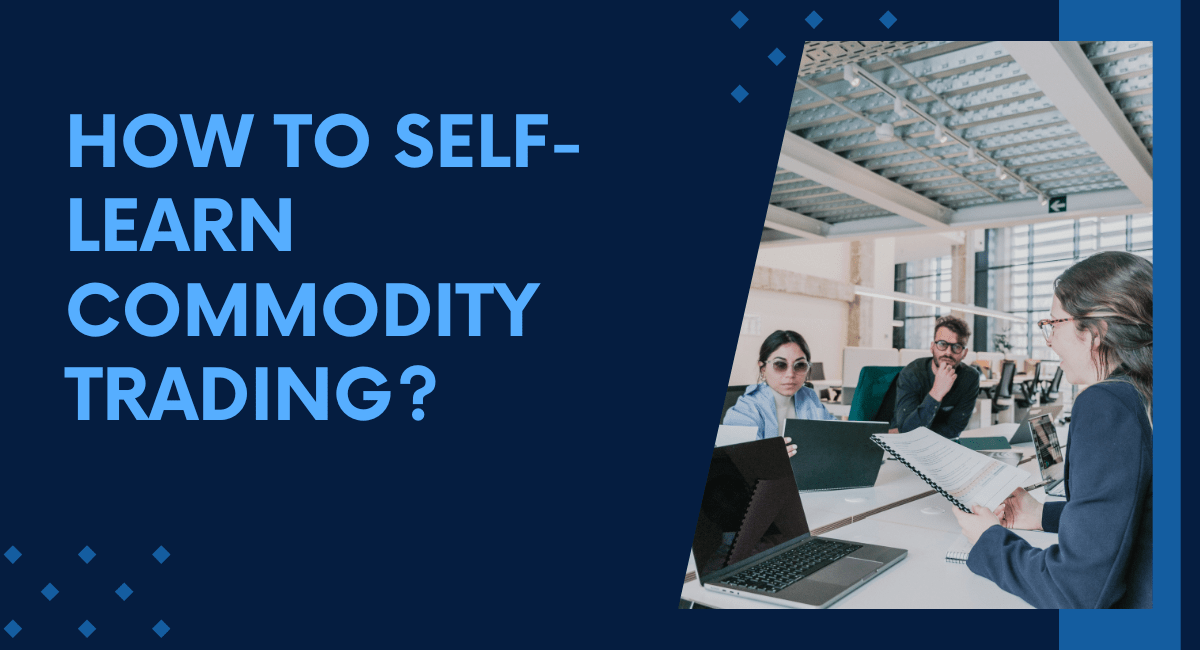Commodity trading provides an opportunity to diversify your investment portfolio, manage risks and potentially yield high returns.
With the increased demand for commodities in the market (where supply is limited), investing in gold, silver, copper, zinc, crude oil, natural gas, black pepper, cotton, or other commodities helps you maintain parity with increasing prices and provide a hedge against inflation.
Do you want to take advantage of global market trends by learning commodity trading? You are on the right page. You can easily self-learn and start commodity trading to gain all the required knowledge. This article will help you identify the factors making commodity trading an attractive investment option for traders and how to start it.
What is a Commodity?
A commodity is a raw material or agricultural substance that can be purchased or sold in large quantities.
Hard and soft commodities are the two main classifications of traded commodities. Natural resources like rubber, gold, and oil are examples of hard commodities, whereas agricultural products like corn, coffee, wheat, and sugar are examples of soft commodities.
How Commodity Trading Works?

Commodity trading involves different types of contracts that derive their value from the underlying commodity. Under this trading, the purchasing and selling of physical goods such as metals, agricultural products, or energy resources occur.
Commodities are traded at a standardized future price. Traders speculate and attempt to make profits by buying these commodities at a lower price and selling them at higher prices in the future.
Traders may execute different strategies to predict price movements and boost their profit. For instance, many traders use fundamental analysis and technical analysis to forecast the behavior of the commodity.
The primary factors determining the price of these commodities include demand & supply dynamics, economic indications, geopolitical events, and weather conditions. If you want to trade commodities, different instruments will assist you in the process of commodity trading, such as futures contracts, exchange-traded funds, or options.
Successful traders always stay updated with relevant industry trends to make informed trading decisions.
Who Participates in the Commodity Market?
The participants in the commodity market are classified into 4 categories. Every category of traders or participants contributes to the robustness of the commodity market:
1. Commodity Market Speculators
Speculators are investors who trade to profit by participating in the futures market. They use the futures prices’ patterns and direction for speculative objectives. They accept risk to yield high returns.
2. Spot / Futures Arbitrageurs
Arbitrageurs are traders that purchase and sell commodities relying on the variations in those prices across different exchanges. They try to profit by exploiting price variations between markets. Arbitrageurs buy and sell the same commodity simultaneously in diverse marketplaces.
3. Hedgers
Hedgers participate in the market to lower their price risk in the spot market. They are typically the commercial producers and consumers of commodities. These professionals participate in the futures market to mitigate or safeguard themselves against the possibility of suffering losses as a result of changing and unstable pricing.
Hedgers are also ready to bear the basis risk, a type of systematic risk where perfect hedging is impossible. This situation arises when correlation testing or matching the relative and underlying price is not done.
4. Directional Margin Traders
Directional margin traders are investors who control broader positions with a smaller amount of capital, expecting the price will move in a specific direction. They aim to profit from price fluctuations.
Why Should You Start Commodity Trading?
Let’s dive in to learn the potential benefits to start commodity trading:
- Diversified Investment Portfolio
- Potential Hedge Against Inflation
- Stable Potential Returns With Less Exposure to Risk
- Cushioning against market fluctuations
- Transparency in the Process
- The best bet for price safety and surety
- Trading on Lower Margin

How to Self-learn Commodity Trading?
Here are some pointers that will allow you to self-learn commodity trading:
1. Join an Online Course
Join an online commodity trading course. An online course will help you learn about the fundamentals of commodity trading from the comfort of your home.

These courses will help you hone your skills in quantitative trading models, back-testing techniques, strategy paradigms, market regulations, and compliance for trading commodities.
These courses are designed in an interactive manner that makes learning insightful and fun. You can opt for such courses from the comfort of your couch and learn at your own pace.
Some of the best online commodity trading courses are hosted by Udemy, Coursera, IFMC Institute, etc.
2. Start With an Offline Course
You can also join an offline course. Apart from gaining knowledge, you can get exposure to various ideas as your peers will be around you. You can also read books about commodity trading to clear your basics. Some of the best books to learn commodity trading include:
- Guide to the Indian Commodity Market
- Investing & Trading in Gold Silver
- Commodity Markets and Derivatives
- Trading Fundamentals English
3. Do Extensive Market Research
Start reading and researching commodity trading. The more you comprehend it, the more the chances of gaining a complete hold of it.
You can learn everything about commodities by gaining information from the exchanges where the commodity is traded. This includes various commodity products, commodity derivatives, lot sizes, liquidity, etc.
How to Start Commodity Trading?
Here are a few things to keep in mind when you start commodity trading–
1. Research About the Market
It is very crucial to understand what the futures and options markets comprise. They are derivatives of the original commodities market, which is the location of the valid delivery of the commodities. An asset in this market, physical commodities, is called a derivative.
2. Choose the Right Broker
Commodities trading uses the same Demat account with National Securities Depository Limited (NSDL) or Central Depository Services (India) Limited (CDSL) as stock trading. This will be the holding account for all your investments in a ‘dematerialised’ or electronic state.
Out of numerous brokerage firms where you can open a Demat account, it’s crucial to opt for a credible source, charging a minimal commission.
3. Documentation
Financial data is essential since commodities are assets with a high level of leverage (borrowed money for funding).A broker will need information on your income, net worth, and creditworthiness to decide whether they wish to authorize you on their platform for trading or investing in commodities.
4. Know your Margin Requirement
Commodities are traded as futures contracts, which are a part of derivatives. You need to know that futures trading involves a margin, an amount that must be kept—the maintenance margin or good faith deposit.
The market for commodities is quite erratic. If the value of your investments declines extensively, your broker may issue a margin call requiring you to add additional capital.
Conclusion
If you understand the fundamentals and manage emotions in the commodity market, you can trade like a pro and build significant wealth!
You can achieve a greater success if you develop a disciplined approach by setting clear investment goals, and implimenting a well-defined strategy, and sticking to it.



